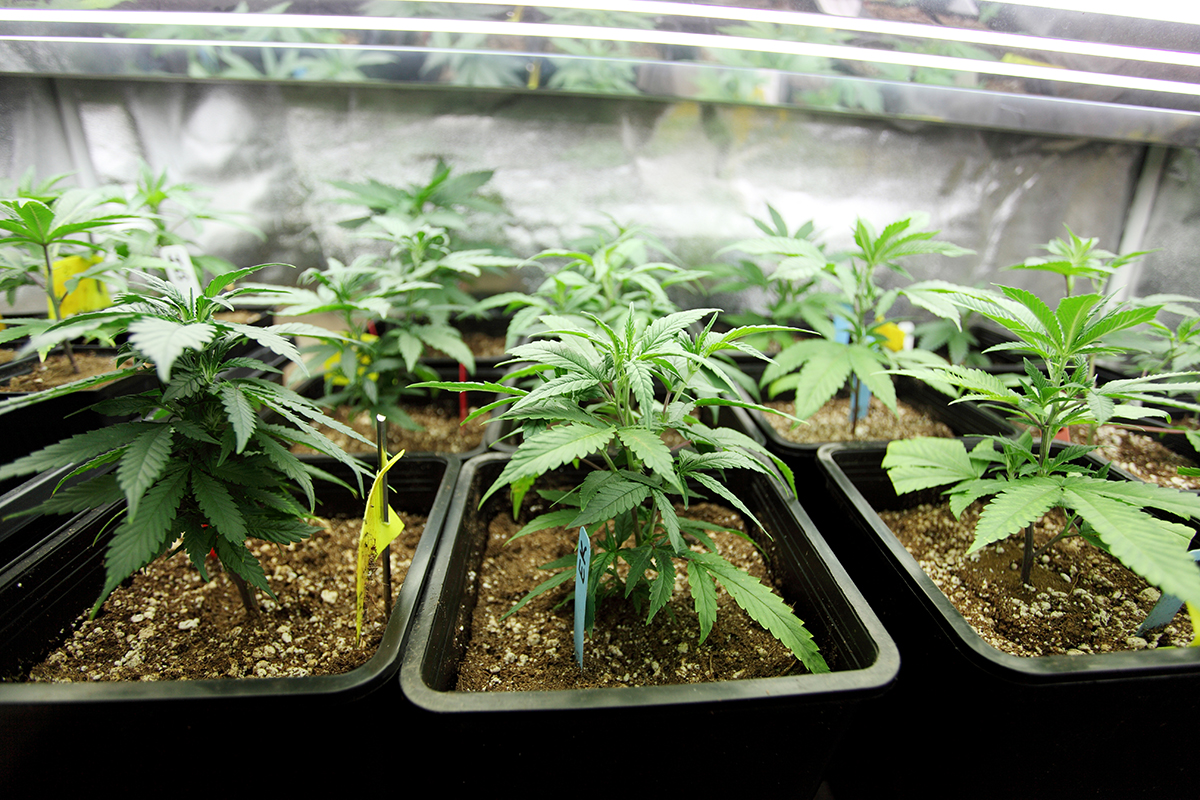The Marijuana Law Hits a Six-Month Speed Bump

Marijuana crop growing indoors via Shutterstock
It’s been two weeks of ups and downs for those celebrating Massachusetts’ new legal marijuana law. While many were taking their first-ever fully legal puffs inside their living rooms over the holidays, lawmakers gathered almost completely without public scrutiny to slow things down—keeping in place, for a little while longer, a temporary system that allows adults to possess and use marijuana, but not to sell it or to buy it in a store.
In case you missed it, a handful of legislators last week voted without warning in informal session to push back a key component of the law by six months. Now, the marijuana retail shops that were supposed to be cleared to open in January, 2018, will instead not be allowed to open until July 1, at the earliest. The vote also gives Treasurer Deb Goldberg, who is responsible for assembling a Cannabis Control Commission and overseeing the roll-out of new regulations for the marijuana industry, more time.
They did this when the Legislature is not in session, so a single dissenting vote would have stopped it from happening. But there wasn’t a dissenting vote, so the bill passed the House and Senate and ended up on Gov. Charlie Baker’s desk. He signed it into law on Friday.
The move should come as little surprise, though. Lawmakers, an overwhelming majority of whom did not support legalization, have been saying for months now that they would seek to delay implementation of the law in order to give regulators more time to plan (and to give the Legislature more time to tweak the law). It’s likely that the vote over the holiday break just speeds up a decision that would have happened anyway when sessions resume this month.
But legal cannabis advocates, and many of the 1.8 million in the state who approved the legal pot law in November, were not pleased about the way things went down.
“We are very disappointed that the Legislature has decided to alter Question 4 in an informal session with very little notice regarding proposed changes. We are willing to consider technical changes to Question 4 so that the new law is implemented in a timely and responsible manner,” Jim Borghesani, spokesman for the former Yes on 4 campaign, said in a statement. “However, our position remains that the measure was written with careful consideration regarding process and timelines and that no major legislative revisions are necessary. Further, the voters of Massachusetts approved Question 4 by a significant margin, and any alteration of the law deserves a transparent, deliberative legislative process.”
“Far from respecting the will of the voters, they don’t even respect the legislative process, the democracy, the laws in Massachusetts, or anything else, and for what?” said Andy Gaus, the press secretary for the cannabis law reform coalition MassCann/NORML, tells the State House News Service.
The Globe‘s editorial board took issue with it, too (and they used the “smoke-filled room” pun, a layup if we’ve ever seen one):
Whatever the merits of the decision, though, making changes to laws without voting isn’t how an accountable, representative government is supposed to function. Going forward, the Legislature should ensure that changes to the marijuana law follow normal legislative procedures.
But Baker, as well as House Speaker Bob DeLeo and (Question 4 supporter) Senate President Stan Rosenberg, say a delay, even one jammed through while many elected officials were still reheating leftovers with their families, is necessary to get the law right.
“The Baker-Polito Administration has been clear that it shares the Legislature’s desire to thoroughly prepare for launching an entirely new industry distributing a controlled substance and is committed to adhering to the will of the voters by implementing the new law as effectively and responsibly as possible,” Baker spokeswoman Lizzy Guyton said in a statement, as reported by the News Service.
There are a host of issues to be debated in the new year, among them whether to amend the portion of the law that allows residents to grow up to 12 plants at home, and whether to hike the tax on retail sales of the drug above the 3.75 percent excise tax voters approved. Rosenberg says he wants to pass a bill addressing those issues “within six months.”


